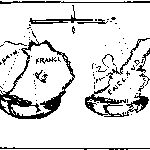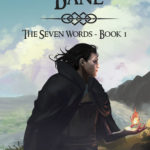Christian Fiction = ???
I’ve decided to explore some issues concerning Christian fiction. To do that, I need to hash out what I mean by the term Christian fiction. The term has become so vague and broad that it means different things to different people. Some I’ve encountered are downright hostile to the term.
One definition to shove off the table right away is I don’t mean to imply that the story itself can be Christian.
As in hear the Gospel and get “saved” by any definition of that term. To imply that legalistic definition is what one has to mean using that term is suggesting we stop using the term “rush hour” because hours not only can’t rush, an hour is far from rushing about anything. Terms are given meaning through usage, not by linguistic logic.
The broadest definition is a story that ultimately glorifies Christianity’s God and Jesus Christ.
However, what constitutes “glorifying God” is often squishy.
For example, some might only consider a story that is overtly faith-themed to be glorifying God. Another, telling a quality story as a Christian, whether the story itself ever mention’s God or not, to be glorifying God.
From the later understanding comes the oft repeated phrase, “I’m not a Christian writer. I’m a writer who is Christian.” Though I know the distinction that saying is intended to get across, both really say the same thing.
Likewise, what one group of Christians might consider an error, another accepts as truth. A book written by one author will be seen as glorifying God by one segment of Christendom but as defamation of God and the Christian faith by another.
Whether a story ultimately glorifies God or not, perhaps only God really knows.
We can point to stories most Christians would agree do and don’t, but on many other titles there can be much debate. You can always find someone who believes it doesn’t.
So while I agree with the goal on a personal level as an author, judging whether a story is Christian or not based upon that criteria can be very subjective, depending on how broadly you define that criteria and which theological tradition you are basing that judgment on.
There are two definitions that are often synonymous, but not necessarily.
Christian fiction contains Christian themes central to a story’s plot and/or characters.
This can be heavy as in a book about someone’s journey to God or light as in seed-planting attempts which tend to focus upon Christian-based morals and worldviews than overt Christian references.
It is the later some have problems calling Christian fiction since often those values could be just as easily applied to any other religion, including atheism. As I argued some months ago on my own blog, moralism isn’t the fullness of the Gospel, but neither should we expect every story labeled Christian to contain the fullness of the Gospel in order to be worthy of that label.
That said, what might be classified as Christian in this definition can fall outside it in the following one.
Fiction written for the Christian audience.
Usually fiction with Christian themes central to the story would be written to appeal to a Christian audience. However, the less obvious that becomes, the less it will appeal to those readers unless they tend to cross over into the general market for their reading. Even then, when anyone picks up a Christian book, they expect it to focus on Christian themes and struggles.
A Christian audience isn’t the market for plowing and seed-planting in most cases
Despite that, most overt Gospel presentations happen in that market. Rather, such efforts should be directed primarily to the general market. Writing to that market means a much more nuanced approach. It doesn’t mean there can’t be Christian themes, but they need to be presented in such a way as to draw the non-Christian to Christ, not slap them in the face with preaching.
The problem when I define it this way, however, is that many people think “CBA”.
Then it is off to the races to either criticize or defend the CBA and its market. It is the concept that CBA = Christian fiction that leads to a lot of heat from some “authors who are Christian” concerning the term.
That perception used to be true. CBA is an acronym for the Christian Bookseller’s Association: membership consisting of mostly Christian bookstores. Due to the “tyranny of the most vocal,” most bookstores’ market for fiction grew very narrow. This led the publishers to reject stories containing content they knew wouldn’t sell, knew bookstore owners wouldn’t stock.
Several years ago, if it didn’t sit on the shelf of a Christian bookstore, your Christian novel would never have found an audience, much less get published. Selling in a bookstore was the only game in town.
The result was the Christian fiction market could only reach a small fragment of the full Christian market. Any author who wrote a book for a wider Christian audience was out of luck, along with the readers who would have enjoyed their novels.
With the opening of online sales in both POD and ebooks, an author’s only option to get published and distributed is no longer just the CBA.
That unreached segment of the Christian population not serviced by the CBA could now be reached. Small publishers like Marcher Lord Press and Splashdown (disclaimer: I’m published through Splashdown) distribute their books through online channels. Writers have the option of self-publishing. We’ve also seen Christian publishers, no longer totally dependent upon the CBA to distribute books, begin to loosen up.
The fact is that while it is still largely untapped, writing for the Christian market no longer only refers to writing for the narrow CBA audience. It also now practically refers to the wider Christian audience who haven’t set foot in a Christian bookstore in decades.
My definition would be a combination of those two.
Christian fiction is stories written for the Christian audience focusing on Christian themes, issues, and struggles.
Stories aimed at the general market containing Christian themes—however light—would be Christian in one sense, but aimed for the general market, so not intended to reach a Christian audience. To classify them as “Christian” would be to mislabel them. Such books need to be freed from the “Christian ghetto” if they are to have any influence upon wider society.
Likewise, while a story could end up on a Christian bookstore shelf that has little to do with Christian themes, issues, and struggles, it is also mislabeled. It won’t sell to that audience. What’s the point of labeling a story as Christian if it has little to do with Christianity?
That’s my definition. When I bring up the term Christian fiction in following discussions, that’s what I’m talking about. Based on that, my Reality Chronicle series is Christian fiction. My Virtual Chronicles is not, even though the values there are compatible with Christianity and have a Christian worldview underlying them.
Disagree with my definition? Why?










































Books like Lord of the Rings make no mention of the Bible or any of its tenets, and yet are deeply Christian, reflecting Christ’s promise of redemption. I believe this is why so many people not only read them, but reread them: they feel that glimmering of Truth.
LOTR is a good example of general market fiction with Christian themes and worldview, but by no means overt. Of course, there was no separate Christian market back then. Christian themed stories like the Chronicles of Narnia had to be served in allegories and analogies to fly in that market.
One could postulate that those stories and their popularity among Christians as well as the general market is in part responsible for the birth of the Christian segregated market. Though obviously it was a larger movement back in the 60s and 70s since it encompassed music and other areas as well.
I like your definition; it’s focused, specific, and accurate!
Defining terms is extremely helpful for detailed discussion. Your definition works for me. It makes sense to define a book based on the audience and themes. That’s how it works in discussing things like “YA books” — a YA book is not only targeted to a young adult audience of a certain age but also generally deals with coming-of-age themes.
I’ll keep this article in mind when entering these types of discussions elsewhere. Linking to it should help keep things on track. (Yes, I’m an optimist.)